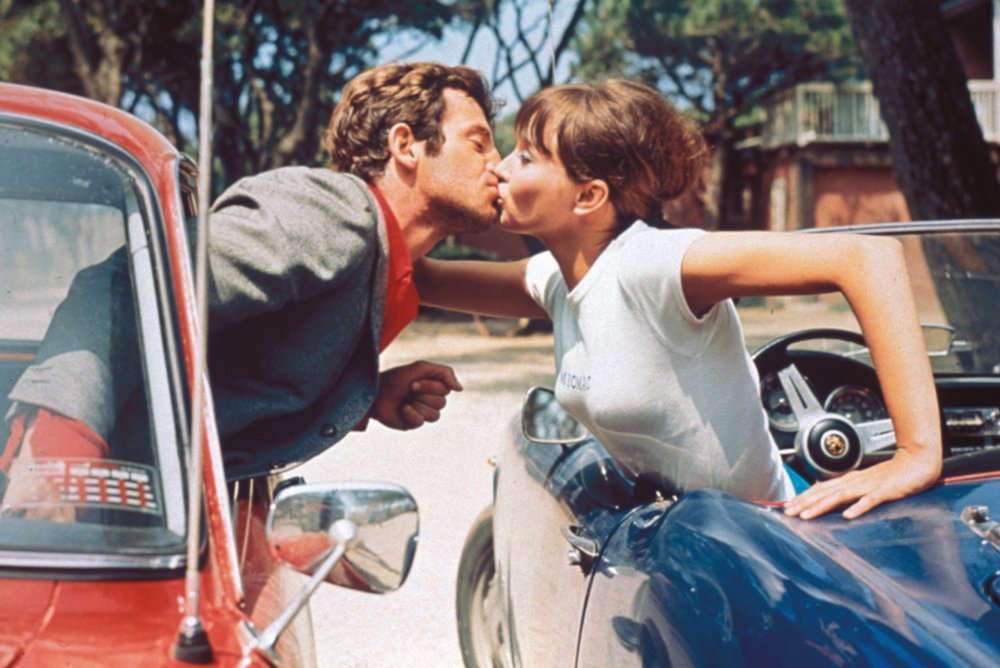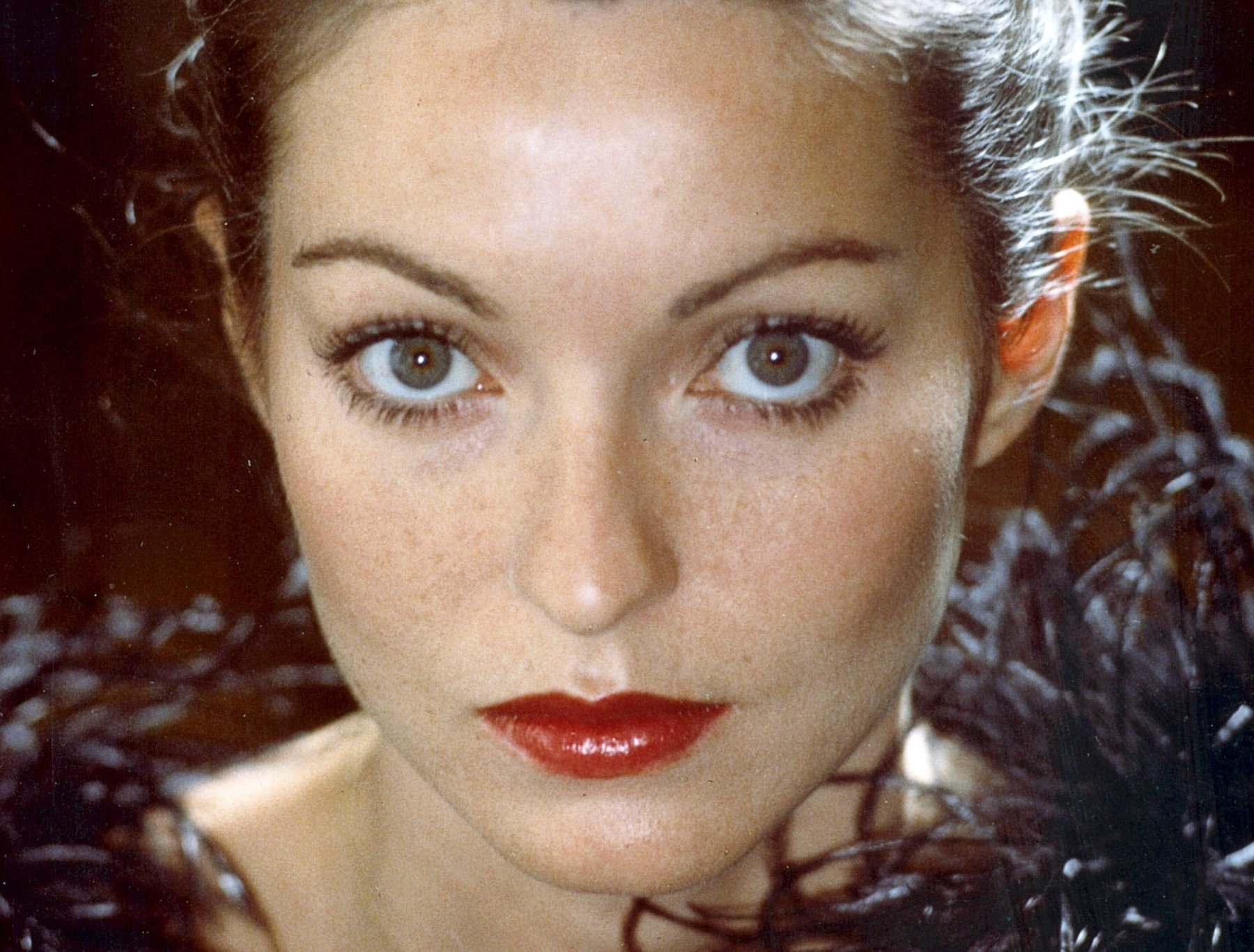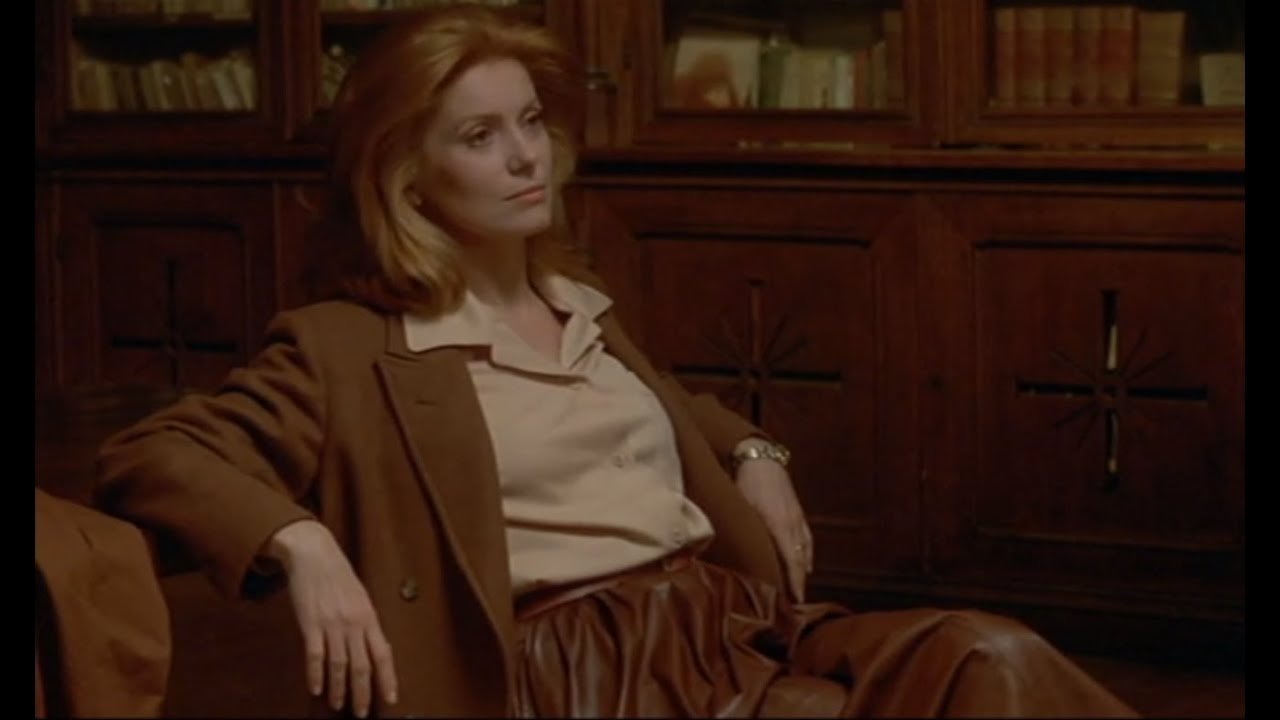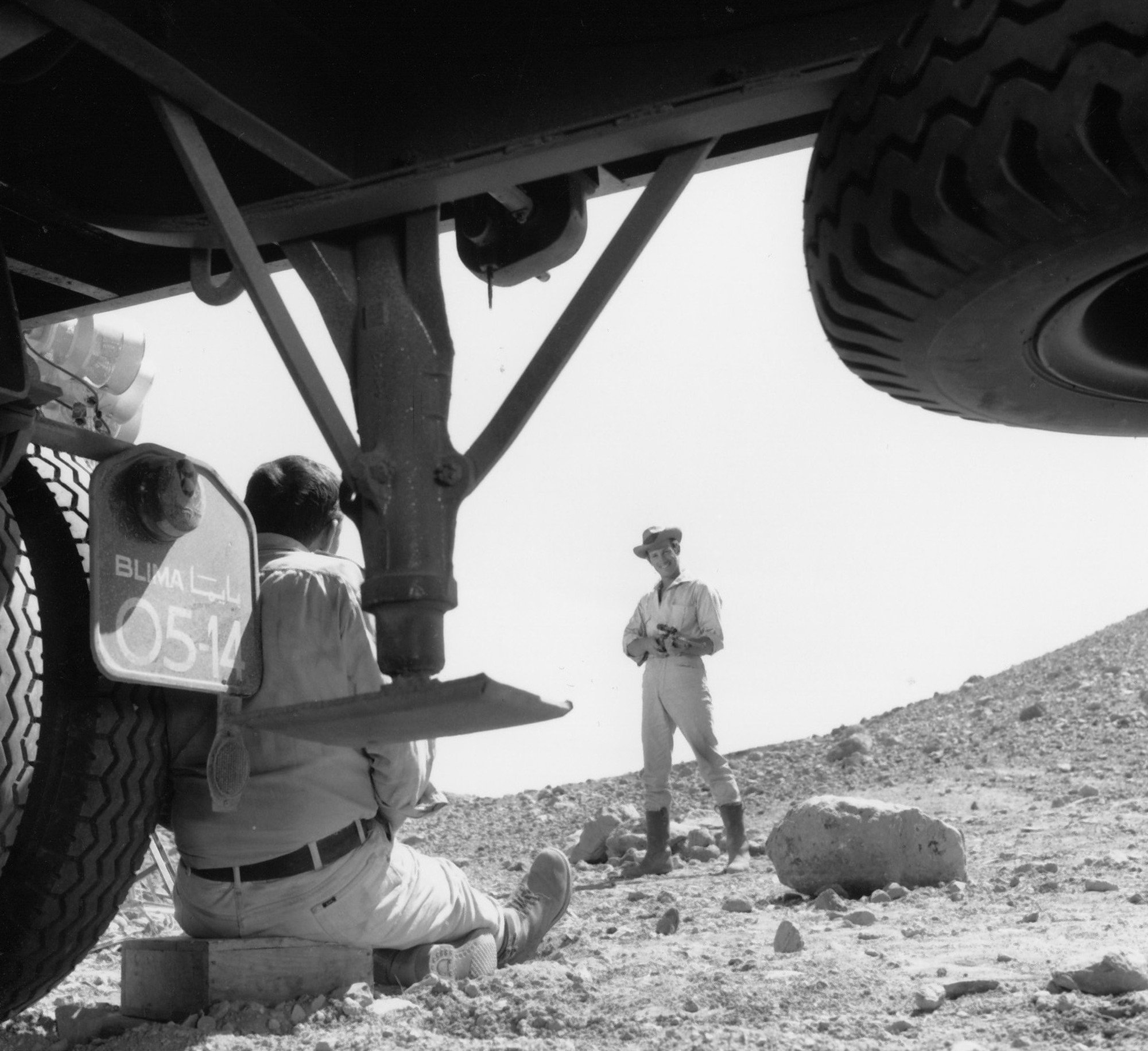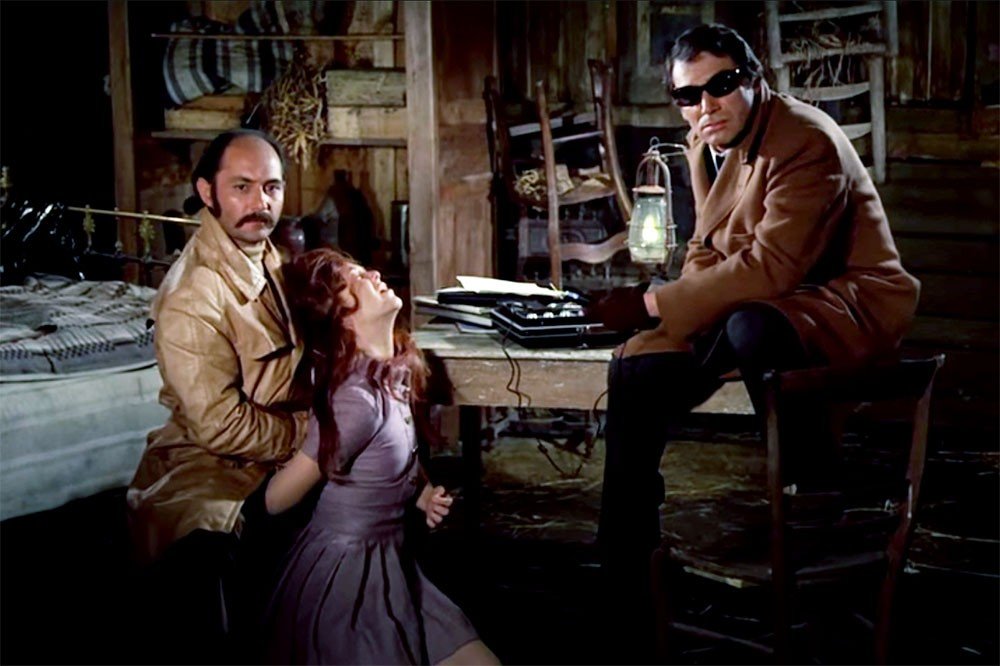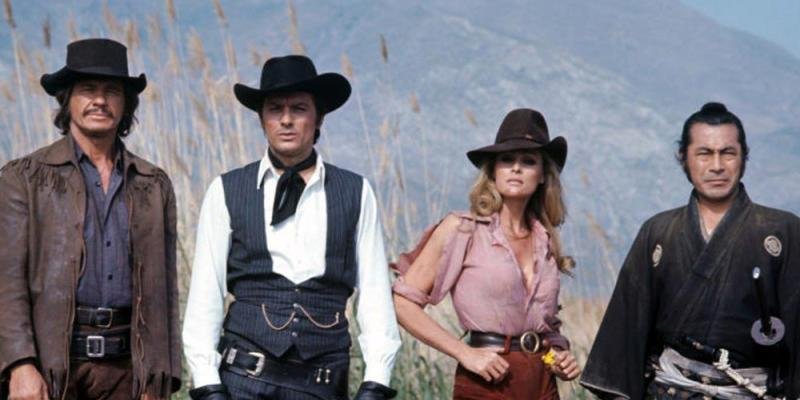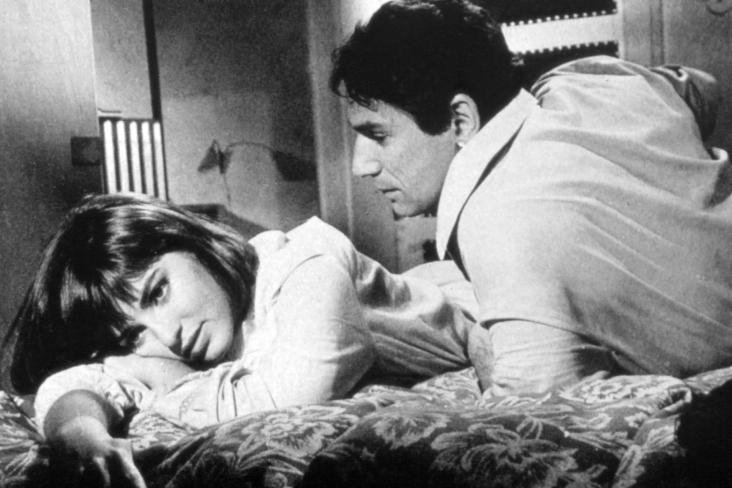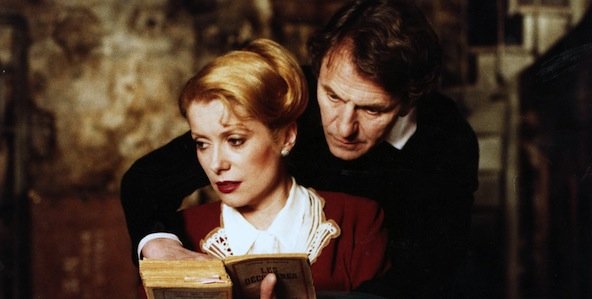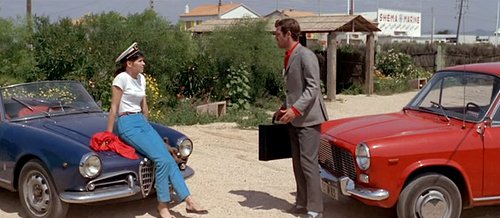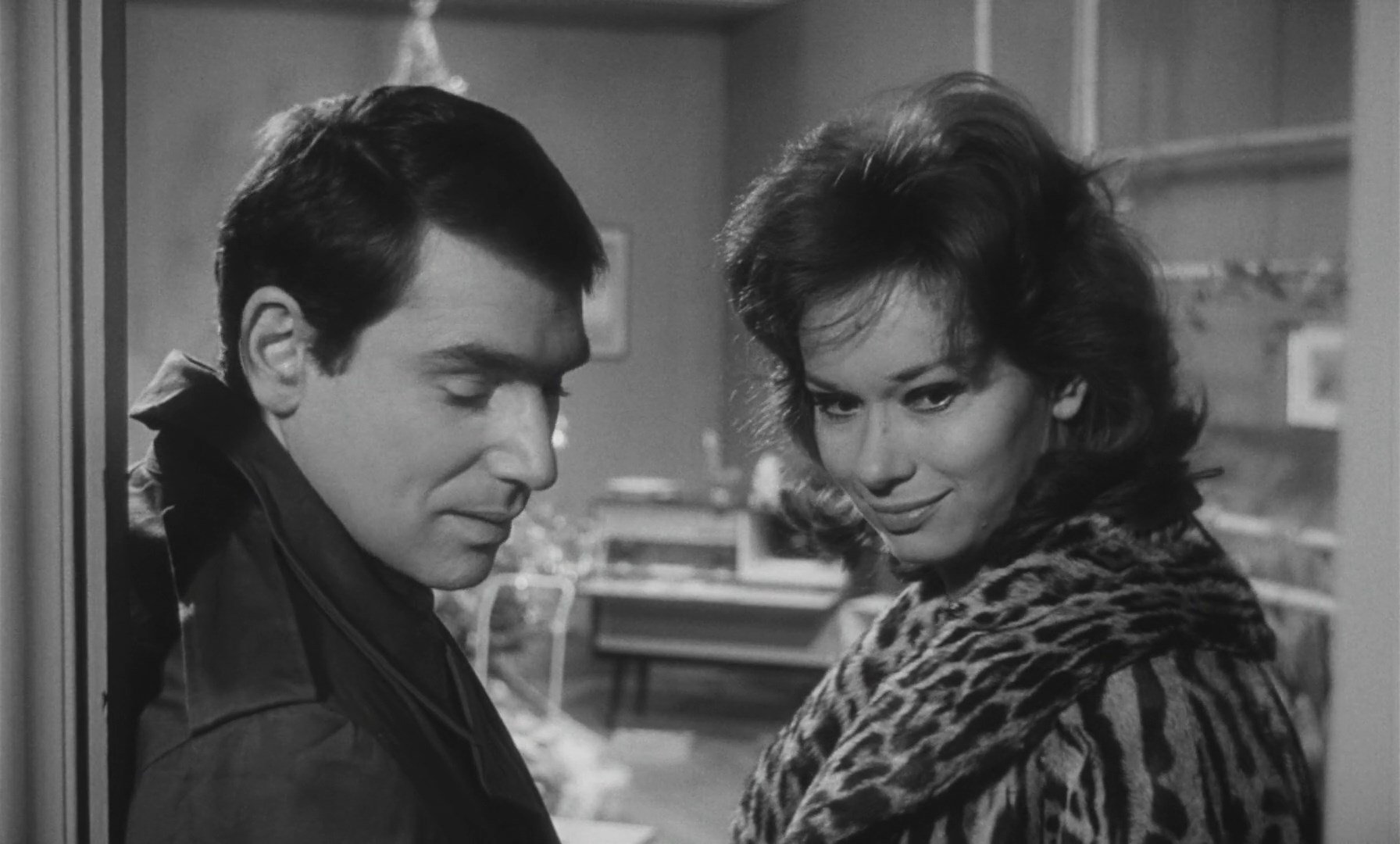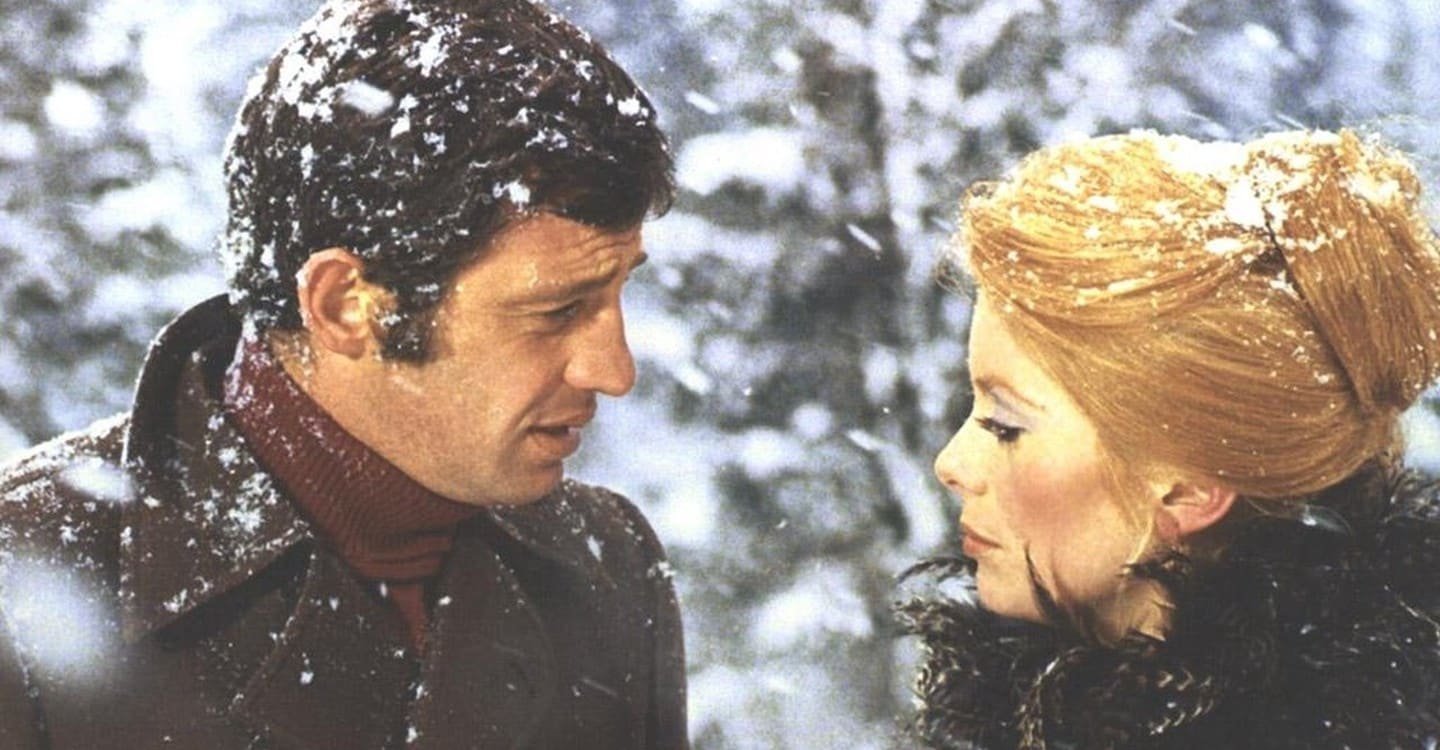In 2021, I watched 508 movies. This is not healthy or wise behavior, but this was not a healthy or wise year. In order to extract at least some value out of those 1000ish hours, I’m going to write about it.
France finished third this year in terms of total films watched (54), but it might have finished first for batting average. The best French films I saw were just as incredible as anything from the rest of the world, there were a ton somewhere in the good to great range, and even the worst were no worse than “ok.”
I came in, granted, with more affection and familiarity for French stars than those from most other countries. Delon and Belmondo and Marceau and Moreau were already old friends to me, and following their names from one film to the next probably helped bump up the average.
That said, familiar faces only lead me to about half of my Top Ten, so maybe it’s just a fluke of sample size. Suppose I’ll have to watch more French film next year to find out.
Either way, here are the French actors, actresses, directors, and films that made the biggest impact on me in 2021. As with the other articles in this series, if you’re only interested in the Top 10 films, I won’t be offended if you skip ahead, and you can find them about halfway down the page.
MOST WATCHED ACTORS
5 MOVIES: Alain Delon
Joy House (1964), Red Sun (1975), Zorro (1975), Le Choc (1982), Le Battant (1983)
Arguably the most handsome man to ever grace the silver screen—an arena not known for a shortage of contenders—Alain Delon was (along with frequent collaborator Jean Gabin) one of the first French actors that captivated me… and that’s what he was, ultimately: an actor. He had the looks to coast; careers have been made on far less. But Delon always… ok, usually… showed up to work. Compare two of his most famous performances, Purple Noon’s capricious Tom Ripley and Le Samourai’s taciturn block of frozen will, Jef Costello; the gulf between the two is greater than your bog-standard Hollywood heartthrob could fill. Delon was certainly a heartthrob, but he was anything but bog-standard.
The Delon films I saw this year weren’t, mostly, as good as the two cited above, but every one of them was a good time in its way. The weakest was probably his inexplicable Zorro movie, which features Delon doing great work in the dashing title role while tonal whiplash, dubious dubbing, and an incomprehensibly incongruous and omnipresent theme song burn the rest of the film down around him. Neither Le Choc or Le Battant stand among his ten greatest crime pictures, but both are fun, gangster-lion-in-winter stories that do pretty well by Delon—though it’d be fair to accuse him of coasting a little in each—while failing to make much use of his overqualified leading ladies (Catherine Deneuve and Anne Parillaud, respectively). Le Battant is probably the better film of the two, but Le Choc is easily more fun, rife with wacky bullshit like Deneuve’s turkey farm in amongst the otherwise serious crime opera, lending the whole enterprise a probably unintentional camp charm.
Red Sun was the one Delon rewatch I did this year, for good reason. Hard to get more out of his sinister charms than by making him a treacherous left-handed cowboy literally named “Gauche.” Finally, Joy House (from the same director as Purple Noon) turned Delon’s most famous assets—namely his ludicrous attractiveness and effortless sexuality—against him. He plays a runaway crook who thinks he’s found safe harbor with a lonely widow and her niece (played by Jane Fonda!), only to slowly realize he’s gone from the frying pan into the fire*.
*The fire is also played by Jane Fonda.
11 MOVIES: Jean-Paul Belmondo
A Monkey in Winter (1962), Greed in the Sun (1964), Crime on a Summer Morning (1965), Pierrot le Fou (1965), Mississippi Mermaid (1969), The Burglars (1971), The Pariah (1972), Le Magnifique (1973), The Night Caller (1976), The Body of My Enemy (1976), Hold Up (1985)
They don’t come any cooler than Belmondo, but much as people can sometimes miss the forest for the trees with Delon’s striking good looks, too often people equate Belmondo solely with “cool” as opposed to “cool, a brilliant and nuanced performer, and the platonic ideal of a movie goddamn Star.” After his passing mid-year, it was bittersweet to read so many eulogies and tributes that focused on his charisma and cool factor, but often neglected to mention the world-class acting talent beneath them.
Of the eleven of his films I watched in 2021, all but two are crime pictures. That’s an indictment of my range, not his—he made plenty of comedies, dramas, dumb action movies, less dumb action movies, romances, you name it; they just mostly weren’t on my docket this year. And even the crime pictures are about as different and diverse as crime pictures can get. Godard’s Pierrot le Fou, for instance, is a postmodern farce of a caper movie (and, while we’re at it, Hold Up—which opens on Belmondo robbing a bank dressed as a clown—is a regular farce of a caper movie), while Greed in the Sun is a tense, cat-and-mouse desert chase between an insouciant Belmondo and a thoroughly annoyed Lino Ventura*. And speaking of chases, The Burglars has Belmondo starring in the greatest car chase of the 1970s (I said what I said, French Connection). The Night Caller meanwhile pits his harried detective against a vicious, misogynistic serial killer, while Crime on a Summer Morning sees him as a con man contending with both his promotion to kidnapper and his toxic, co-dependent relationship with his also con artist sister. The Pariah is a pretty by-the-numbers gangster flick for its day, and The Body of My Enemy is a winkingly clever subversion of movies like The Pariah. Mississippi Mermaid is just as self-aware as Pierrot le Fou or Body of My Enemy, and yet even more sincere than Pariah or Night Caller.
*I didn’t watch quite enough of his movies this year for him to crack this list, but for the record Lino Ventura gives the best “thoroughly annoyed” in the business.
None of those films are anything approaching bad, and several of them are great. Three of them appear on the Top 10 list below, and a few others were near misses.
For his non-crime offerings for the year, first was the mostly-perfect-minus-one-indefensibly-misogynistic-sequence Le Magnifique, starring Belmondo as both the Bond pastiche Bob Sinclair, and a second role I dare not spoil here. Last but not least was A Monkey In Winter, the lone pairing of Belmondo and the legendary Jean Gabin, a darkly comic story about male friendship, responsibility, and alcohol… and how any one of those three might inform the others.
*Le Magnifique is the sort of film it’s best to go in knowing as little about as possible, with the exception of the necessary content warning above.
These films, too, were excellent. Belmondo is one of those rare actors who almost can’t make a bad movie; his mere presence transforms a bad script into a passable one, a passable film into a good one, and so on. All told I’ve seen 24 Belmondo films in my life, and the worst thing I have to say about the worst one of them is “needed more Belmondo.”
That’s a criticism, incidentally, that also applies to every film he isn’t in.
Rest in peace, Bébel.
12 MOVIES: Robert Hossein
The Wicked Go To Hell (1955), Blonde in a White Car (1959), The Game of Truth (1961), The Taste of Violence (1961), Paris Pick-Up (1962), Death of a Killer (1964), Marked Eyes (1964), Le Vampire de Düsseldorf’ (1965), Cemetery Without Crosses (1969), The Falling Point (1970), The Burglars (1971), Trivial (2007)
Robert Hossein was never as big of a star as Delon, Belmondo, or Gabin, and he certainly doesn’t enjoy the same kind of modern reverence they do, but he might have been in more great crime pictures than any of them. Probably best known as a supporting player in the greatest French heist movie—and greatest anything heist movie—ever made, Rififi, Hossein had plenty of other great supporting roles, and more than his share of excellent leading man turns in smaller noirs. He was also a prolifice director early in his career, but we’ll get to that later.
What Hossein lacked in megawatt charisma or starpower, he made up for in haunted vulnerability. Even his toughest, meanest, most monstrous characters have streaks of sentimentality to them. In this batch, that means you find yourself feeling something—most often pity—for the jailhouse bully in The Wicked Go to Hell, the imperious intruder in Game of Truth, the taciturn mastermind in Falling Point, the deranged old pervert in Trivial, and even the… checks notes…Nazi serial killer?!—in Le Vampire de Düsseldorf’. Their specific brands of antagonism are as varied as their motivations, but all five of them share a knowing sadness in their eyes, and a desperation in their devilry. Most if not all of them are cleanly beyond redemption, but each of them is so keenly aware of having crossed that Rubicon—so assured of their own damnation—that we can’t help but empathize… and for some of them, the most vile thing they could possibly do to a viewer is engender that empathy.
His protagonists, similarly, are at best deeply flawed, and more often are simply bad people who’ve stumbled into sympathetic circumstances. To wit, his callous gunman in Cemetery Without Crosses is less a hero than a weapon incautiously aimed by Michèle Mercier, and his put-upon ex-con in Paris Pick-Up may mean mostly well but also has at best a reluctant grasp of important concepts like enthusiastic consent. His “heroes” in The Burglars and A Taste of Violence are a thief and a kidnapper, respectively, while his character in Blonde in a White Car is motivated first by sexual curiosity and only distantly second by empathy. The alleged protagonist of Death of a Killer spends the entire movie trying to justify killing a guy he thinks might have slept with his sister. And yet, we root for each of them, in their turn, in spite of their obvious inadequacies.
I have neglected to mention Marked Eyes til now, as his role there does not fit cleanly into the hero/villain binary above. Or rather, which of those two things he might be is a central question of the film, and his gift for putting hearts into heels and sins into saviors make him uniquely well-suited to the task, simultaneously projecting both perpetrator and patsy.
All of Hossein’s characters live in shades of gray. Good thing he made so much noir.
MOST WATCHED ACTRESSES
4 MOVIES: Marie-France Pisier
Death of a Killer (1964), Marked Eyes (1964), Le Vampire de Düsseldorf’ (1965), The Body of My Enemy (1976)
I’d never seen a Marie-France Pisier movie until November of 2021, but I watched four by the end of the year (and five more since). I first saw her in The Body of My Enemy as a rebellious bourgeoisie heir who begins the film as one of the peripheral targets of Belmondo’s vendetta, and ends it as something else. The chemistry between her and Belmondo is the strongest part of the movie—and it’s a decently strong movie besides—and I’d have happily watched them banter, snipe, and seduce for the full two hours.
Next was Le Vampire de Düsseldorf’, where she plays a nightclub singer who’s unwittingly besotted a serial killer (played by Robert Hossein). Hers isn’t the juiciest part on paper, yet she steals every scene she’s in and seems to command such attention as to bend the scene and world around her when she performs; this is to the movie’s benefit.
She has a smaller—but essential—part in Death of a Killer as the sister to a killer (Hossein again)…and love interest of his target. She’s only in maybe five or six scenes, but one of them is the best scene in the movie. She has more to do in Marked Eyes (also with Hossein), as a bored scullery maid turned sexpot who finds the mysteries and potential murders of the plot an amusing diversion from her dishrag daily routine.
France-Pisier has a knack for combining playfulness and mischief with life-or-death dramatic stakes without diminishing either, and it makes her a compelling and irreplaceable performer; I don’t think there was an actor or actress I saw for the first time in 2021 that made a larger impression.
6 MOVIES: Sophie Marceau
L’Amour Braque (1985), Police (1985), Anthony Zimmer (2005), Trivial (2007), Female Agents (2008), Don’t Look Back (2009)
Sophie Marceau is a phenomenally gifted actress, but what I learned this year is that she is also the writer and director responsible for what might be the single largest heat check in cinema history.
Observe: Trivial. A film written by, directed by, and starring Sophie Marceau. It’s a labyrinthine mystery with a very clear central thesis: Sophie Marceau is so agonizingly beautiful that men will build their whole lives around her based on as little as a glance. The absolute hubris to pitch—and then produce—that movie is exceeded only by the absolute swagger required to pull it off… and yep, she nails it. Almost as if to back up the movie’s case, its leading man (Christopher Lambert) fell in love with Marceau during the production and married her shortly after. The best defense of a heat-check shot is to make it, and Trivial is nothing but net.
Trivial wasn’t the only—or best—Marceau picture I saw in 2021. That honor goes to Female Agents, a grim WWII thriller about Marceau’s French sniper leading an all-female squad of spies on an assassination deep in enemy territory. She’s got a very heavy lift in it, carrying most of the film’s exposition and the lion’s share of its emotional heft, two agendas which could very easily work at cross-purposes in the hands of a lesser actress, but Marceau keeps things moving briskly along with both pace and pathos.
Police is an otherwise decent neo-noir hobbled by a lifeless Gérard Depardieu performance, but Marceau is excellent as the conflicted gun moll of a smalltime crook. She even better as the conflicted gun moll of a mediumtime crook in the fast-forward mescaline trip of a movie that is L’Amour Braque. Not to imply she’s a little typecast, but she was also good as the gun moll of bigtime crook in Anthony Zimmer, which is more competent than excellent, but still an exceedingly pleasant way to kill ninety minutes.
Finally there’s Don’t Look Back, arguably an even bigger heat check than Trivial, as its plot revolves around Marceau’s character slowly transforming into Monica Belluci—the horror!—against her will. It’s decent, but it’s a film that feels perpetually on the verge of unlocking something really interesting without ever quite getting there.
Marceau is an extremely talented actress whose spent a lot of her career in parts that leverage her considerable beauty, but work like Female Agents proves she can thrive outside of those parts, too, while Trivial proves that there’s also a defensible and obvious reason she keeps getting them… and she knows it.
10 MOVIES: Catherine Deneuve
Belle du Jour (1967), Mississippi Mermaid (1969), Hustle (1976), À Nous Deux (1979), Ecoute Voir (1979), The Last Metro (1980), Le Choc (1982), Le Voleurs (1996), 8 Women (2002), Les Liaisons Dangereuses (2003)
Catherine Deneuve was not only the French actress I watched most in 2021, she was also the actress I watched most overall. She was aided only slightly by working in multiple languages, as only one of the ten films I saw her in (Hustle, which made my Best of the USA list) was produced outside of France. The main reason she was my most-watched actress is that she took a lot of interesting parts, and invariably played them well.
The most famous performance of hers I saw this year is also the oldest, Belle du Jour, a brilliant movie about sexuality and repression and kink and truly inexplicable taste in men. It lived up to its reputation—mostly because Deneuve walked an impossible tightrope between remote and relatable—and yet it wasn’t nearly my favorite.
I did like it better than Le Choc, which largely squandered Deneuve’s only pairing with Delon by giving her absolutely nothing to do, or À Nous Deux, where she was great as a woman on the run but the movie around her was so forgettable I literally can’t tell you what she was running from, or why, or with whom beyond vague recollections that she eventually ended up with the guy, maybe, or parted tragically. I think it was probably one of the two.
Everything else she did made an impression. She took on the Metreuil role in Les Liaisons Dangereuses without drowning in the formidable shadows of Moreau and Close. She does all of the emotional heavy lifting for Les Voleurs, as a lesbian philosophy professor in a love triangle between a gangster and their mutual girlfriend, despite being locked out of the main plot, and the rest of it functions largely thanks to her injecting enough pathos to go around.
That wasn’t her only queer* role, either. Ecoute Voir saw her take on a Chandler-esque hardboiled persona as a bisexual private eye investigating a mysterious cult. The film is uneven—though to be fair the highs are certainly high—but Deneuve is so good and so natural in the Bogart/Mitchum archetype that it left me wishing she’d made a dozen more films as the character.
*In fact, she had at least some level of romantic engagement with other women in four out of the ten films, and I didn’t even watch The Hunger this year.
I also saw her two outings in François Truffaut films, Mississippi Mermaid and The Last Metro. She was sensational in both, first as an irresistible siren, then a besieged heroine just trying to put on a damn play in spite of the Nazi occupation, her Jewish husband hiding in the basement, a horny resistance fighter turned co-star, and plenty of the usual theatre kid melodrama from the cast and crew.
Lastly, she was one of the 8 Women, joining seven other legendary French actresses in what can most succinctly be described as French queer musical Knives Out.
That’s an impressive slate of weird, interesting, and great films—plus a couple less memorable outings—but I think the biggest reason Deneuve ended up on the top of my “most watched actresses” is that she is one of those special performers who so often creates a character so captivating that, at the end of the movie, your first thought is “I’d like to see more of that.” So you fire up another Deneuve movie, and the list gets ever longer.
The joke Deneuve plays on you then, is that none of these characters are more of the same. That’s a different kind of consistency in that than, say, John Wayne or Ryan Gosling giving you endless variations on the same performance.
And a more rewarding one.
OTHER STANDOUT ACTORS & ACTRESSES WORTH MENTIONING:
Jean Gabin, Jeanne Moreau, Brigitte Bardot, Marina Vlady, Jean Servais, Henri Attal, Lino Ventura, Bernard Blier, Isabelle Huppert, Anne Parillaud, Pierre Fresnay, Dominique Zardi
MOST WATCHED DIRECTORS
3 MOVIES: François Truffaut
The Bride Wore Black, Mississippi Mermaid, The Last Metro
Jeanne Moreau (mostly) defies her own film’s title in The Bride Wore Black.
I’m unforgivably late to the party on Truffaut, but now that I’m here allow me to confirm that it is one a hell of a party. Perhaps the most famous and acclaimed of the French New Wave directors, my first exposure to Truffaut came not from his most beloved pictures—The 400 Blows, Jules & Jim, Day For Night, etc.—but more genre-focused fare. I have no complaints. The Bride Wore Black is a perfect revenge movie, Hitchcockian—nobody loved Hitchcock like Truffaut loved Hitchcock—and devilishly funny. It’s also refreshingly feminist, and yet another movie to which Kill Bill owes an enormous debt*.
*Oddly, while Tarantino usually cheerfully admits his influences, he claims he’d not seen this one when he made Kill Bill. It is difficult to watch the film, in which a mysterious woman known only as The Bride targets the five people behind her husband’s death on the day of her wedding for violent revenge, and not consider him a liar.
The other two are even better. The Last Metro is peripherally about the Nazi occupation of France and apparently about a love triangle amidst the production of a play, but what it’s really about is making art (in this case, a play). It’s one of the best films I’ve ever seen on the subject, which of its three leads—and many of its supporting players—showcasing a different facet of the way art overtakes life and vice versa. That description makes it sound like a dense, literary, eat-your-vegetables kind of film that’s good but not fun, but in practice—or perhaps rehearsal—it’s tremendously entertaining throughout, funny and thrilling and fierce; that it has so much to say is fantastic, but inessential. It’s magnificent popcorn entertainment, and it’s deep, meaningful art. You can engage with it on either level, or both, and come away satisfied.
Then there’s Mississippi Mermaid, a crime “thriller” that’s only intermittently concerned with thrilling. It pairs Catherine Deneuve and Jean-Paul Belmondo in a tale of mistaken identity, or cynical greed, or true love, or necessary compromise, or whatever it feels like being about from scene to scene. Every scene is good, so it doesn’t matter too much what it’s about at the moment. Every scene featuring either my favorite French actor or my favorite French actress probably had something to do with it, but given how indifferent I was to Le Choc (which could make a similar boast), I suspect Truffaut being an exemplary, medium-defining genius craftsman at the peak of his powers was probably a bigger factor.
4 MOVIES: Henri Verneuil
A Monkey In Winter, Greed in the Sun, The Burglars, The Night Caller, The Body of My Enemy
Lino Ventura’s pursuit of Belmondo stalls out in Greed in the Sun.
Henri Verneuil can’t claim to have made the greatest French heist film—that’s Jules Dassin’s Rififi. But Verneuil’s got a strong case for both the second and third, and he might have four of the top five or ten. The two I saw this year, Greed in the Sun and The Burglars*, both star Jean-Paul Belmondo. In fact, all five of the Verneuil films I saw this year starred Belmondo. Since all five were also great fun, I’m not complaining.
*The other two, for those curious, are Any Number Can Win and The Sicilian Clan.
The Burglars was the best of them, though. It’s the platonic ideal of a heist film, with memorable characters, stunning stunts, and charm to spare. Greed in the Sun is less traditional, and only slightly less excellent, essentially doing a crime-soaked riff on Wages of Fear by using the heist as the springboard into a tense, character-driven chase between two old, beat up trucks through dangerous, sun-blasted mountains and deserts.
The Night Caller and The Body of My Enemy are also crime films, though not heists. Night Caller is a schlocky serial killer thriller punching above its script’s weight thanks to the talents of Verneuil, Belmondo, and a criminally-underused-but-excellent-while-she’s-there Lea Massari. Body of My Enemy on the other hand is a viciously class-conscious revenge thriller, simultaneously zany and righteous.
And speaking of zany and righteous, there was also A Monkey in Winter, Verneuil’s ode to male friendship, alcohol, and adulthood. It’s the odd duck of this bunch—a small-town domestic dramedy in with all these bruising crime thrillers—but Verneuil’s talent for building and paying off tension translates surprisingly seamlessly from heists and chases to homes and relationships.
Verneuil is such a master architect of momentum and catharsis, it doesn’t really matter what he’s got handy for building materials.
9 MOVIES: Robert Hossein
The Wicked Go to Hell, Blonde in a White Car, The Taste of Violence, The Game of Truth, Death of a Killer, Marked Eyes, Le Vampire de Düsseldorf’, Cemetery Without Crosses, Falling Point
Pascale Rivault has some complaints with the nature of Robert Hossein and Albert Minski’s visit during Falling Point.
I’ve already spilled a lot of ink about Robert Hossein’s acting, but the single greatest discovery of my year of too many movies was his talent as a director. He was my most-watched director of the year, and I loved every one of his nine movies I saw.
Hossein primarily worked with small casts on tense, character-oriented paranoiac thrillers that often feel like somebody stranded Alfred Hitchcock in France, broke his heart, and then kicked him in the groin. Every one of them sports a melancholic cocktail of misanthropy, empathy, and doomed, weary idealism.
Blonde in a White Car and Marked Eyes are the most traditional noirs: sharp, simple stories about an ordinary person finding themself entrapped by a mystery they can’t find the strength to turn away from. Both feature Hossein as a man caught between two women, though the natures of the women, and of Hossein, vary dramatically.
The Wicked Go To Hell and The Falling Point likewise form something of a paired set, both stories of the intimacy that grows between kidnappers and their victims in remote, beachfront locations. A Taste of Violence is a somewhat further removed cousin as well, as a Western rendition of the same basic setup. The different temperaments in the characters within each film drive the plots in wildly different directions, but there’s a throughline in the pained connections that form between captors and captives. One captive ultimately turns the tables on her captors, another dies for one of hers, and the third comes to respect—maybe even love—the man she met at gunpoint. The tones, though, could not be more different. One story is a tragedy, another a black comedy, and the third a bittersweet paean to the perils of belief.
Death of a Killer and Cemetery Without Crosses form yet another spiritual duology, each following Hossein as an embittered killer hyper-fixating on a single goal rather than risk contending with his own nature. Death of a Killer is a crime story, and more darkly comic, while Cemetery Without Crosses is a bitter, sunburnt love letter to the work of Sergio Leone*.
*To the point that Leone even guest-directed a scene out of respect for Hossein.
The Game of Truth is the outlier of the bunch, a parlor room mystery with an overstuffed cast. Biting wit and an intriguing plot make it an easy watch, but keeping the characters straight—and so much less time to develop them—makes it a bit less emotionally impactful than most of the rest of Hossein’s output, more puzzle box than passion play.
Last but not least, Le Vampire de Düsseldorf’ is likely the best romantic black comedy you’ll ever see about a Nazi serial killer.
Almost none of it should work, but somehow all of it does. Hossein’s filmography in a nutshell.
BOTTOM OF THE BARREL
I lucked out with my French films in 2021; the worst I saw were still decent. No entries for this section!
OLD FAVORITES REVISITED
I only re-watched one French film this year, but it’s one worth talking about
Red Sun (1971)
Stop me if you’ve heard this one before: an American cowboy, a French bandit, a Swiss femme fatale, and a Japanese samurai walk into a Spaghetti Western…
I couldn’t flip a coin to decide which nation’s article this movie went into, but I could have maybe rolled a dice. Co-produced by Italian, French, and Spanish studios, with dialogue alternately in English, Japanese, French, and Spanish, directed by an Englishman and starring American, Japanese, French, and Swiss stars, it’s an absolute cultural hodgepodge of a movie. It’s also an absolute delight, following a tense alliance between cowboy Charles Bronson and samurai Toshiro Mifune, and eventually a reluctant Ursula Andress. They all want to find bastard gunslinger Alain Delon, but they all want to find him for different, mutually exclusive reasons. Bronson needs Delon alive to find a great cache of loot the two stole together before Delon betrayed him, while Mifune has been tasked to kill Delon and reclaim a stolen sword within seven days under pain of seppuku, and Andress wants to reunite with him to ride off into the sunset (and spend Bronson’s money). The plot has a few further complications in the later acts as well, but the core pleasure of the picture is watching four of the greatest stars of the sixties and seventies that you’d absolutely never expect to see in a movie together* sniping at each other against stunning European landscapes pretending to be stunning American landscapes. Doesn’t hurt that the action is fierce, the comedy clever, and the chemistry electric, but this is fundamentally and foremost an exercise in the sheer power of star power… and a damned convincing one at that.
*Though Delon & Bronson would also appear together in the likewise charming-but-bizarre Farewell Friend.
THE TOP 10
HM: Martin Roumagnac (1946)
Nowhere near the single best film from either Marlene Dietrich or Jean Gabin, but it is the only one that features both at once, and a pretty excellent noir besides, enough so that I’m bending the arbitrary rules of this column to tell you I loved it and it’s worth running down, particularly for fans of either star.
#10: Marked Eyes (1964)
Marie-France Pisier thinks about what she knows so far, while Robert Hossein worries about what he doesn’t.
A widow (Michèle Morgan) comes to town after her husband is murdered. We know someone witnessed the murder, but not their identity, nor the killer’s. The widow’s an easy suspect, having inherited money, and with it the distrust of nearly everyone in town. They all hated her husband, but a lot of them depended on him for their income, too, and from the way they look at her, at least a few of them think she killed him. At least one resorts to blackmailing her over it, and her only evidence of her blackmailer’s identity is the faint, telltale tap tap tap of the typewriter she hears every night in her hotel room before finding another letter full of threats and accusations in the morning. The only person who hasn’t already made up his mind to dislike her is Robert Hossein, her husband’s old foreman… but she can’t be sure his kindness isn’t a front. Complicating matters further is his secret girlfriend, the sassy hotel waitress, played by Marie-France Pisier with incendiary caprice. Orbiting around our central trio is a policeman, laid back and unhurried but intent on figuring out at least the identity of the killer. Pressure builds. Paranoia builds faster. The typewriter keeps tap tap tapping away, the letters keep coming, and an invisible noose grows ever tighter around the widow’s neck. A playfully dark score keeps the time whenever the typewriter slumbers. Stellar performances keep the tensions high and the characters compelling, Hossein’s hand on the camera keeps the aesthetics on-point and the answers obscured. The script keeps it simple: three characters, two mysteries, one hell of a movie.
#9: The Last Metro (1980)
Heinz Bennent has some notes on the play he’s secretly ghost-directing from the basement, but Catherine Deneuve is preoccupied by all those damn Nazis.
One of the greatest movies I’ve ever seen about the neurosis of making art, though of course it’s only intermittently about it. It’s also, arguably or primarily, about love, and fear, and loyalty, and idealism, and those goddamn Nazis. Catherine Deneuve plays the leading lady and substitute director of a theatre in Nazi-occupied France. She had to take over because her Jewish husband fled the country—or so she’s told everyone, but in truth he’s hiding in the basement, listening in on rehearsals, and going slightly mad from his own inability to create the art he’s devoted his life to. They meet only at the twilight hours, when no one else is around, and Deneuve can risk bringing him supplies. There’s plenty of talk about actually getting him out of the country but he’s more concerned about his wife, and the play, not necessarily in that order. There’s two other men sharing those concerns. The first is a German critic Deneuve must mask her contempt for in order to protect her theatre and her husband. The second is Gérard Depardieu as the theatre’s leading man by day, lionhearted resistance agent by night. The movie has time for stories about war and love triangles, both reliable subjects to build a movie around to be sure, but Truffaut, like Deneuve’s husband, treats them as subplots to the much more important business of putting on a play. We get more time than we’d think with the various secondary cast and crew, all finding ways to live their lives and pursue their passions and preoccupations while under occupation. We get a lot of the play itself, too, which echoes, and plays in movies usually do, plenty of what’s going on in the lives of its principles. The center of both play and movie is Deneuve, pulling triple duty the hypotenuse of the love triangle, star of the play, and first line of defense against the Nazi regime. It’s one of those roles which asks so much in so many different directions, yet demanding she keep her true feelings both consistent and inscrutable for most of the film. It would tank the picture with anything less than a perfect performance. Deneuve is the right woman for the job, carrying the underwritten love triangle storyline with very little support from the script, aptly juggling the multitudinous and often contradictory thematic elements Truffaut has stuffed the picture with without ever missing a catch, and delivering a heroine so complex and convincing she’d make a lesser movie worth the price of admission by herself. This is anything but a lesser movie, and she makes it worth considerably more than that.
#8: L'assassin Habite au 21 (1942)
Suzy Delair makes her case to Pierre Fresnay.
A great detective must catch a serial killer. His actress girlfriend thinks she should catch the killer instead; it’ll be good for her career, and give her beau more time to spend adoring her, besides. Before long both are made aware of one crucial clue: the killer lives at #21, a boarding house. They both rent rooms, under cover, hoping to catch the killer. The inhabitants of the house are idiosyncratic to the last soul, and each and every one of them is both charmingly off-beat and a completely credible killer. The solution—clever, and presaging certain later films so precisely that to mention them by name would spoil the ending—is clever, but hardly the point. The point is relentless entertainment, witticism, and intrigue. Breezy at only eighty-four minutes, L'assassin Habite au 21’s comedic sensibilities keep it humming along at a great clip even during the necessary early exposition inherent to any mystery, and directer Henri-Georges Clouzout—who would later direct several of France’s most gripping thrillers, including The Wages of Fear and Diabolique—is already a master of suspense and theatricality, making the actual murder and danger scenes every bit as electric as the comedy that suffuses the rest of the script. But the leads, Pierre Fresnay and Suzy Delair, are the real MVPs. Fresnay’s detective approaches his case with dry, almost British detachment, decorum, and wit. Delair, meanwhile is incandescent, ditzy but not dumb, devoted but no doormat. Their chemistry is the special sort that can carry a film, though here it doesn’t have to. The supporting cast are memorably written and perfectly cast, the climax pulse-pounding and knee-slapping by turns. Heck, even the score overperforms. This is simply one of the most innately affable mysteries ever put to film, with thrills and laughs and warmth to spare, a codifying example of “a great time at the movies.”
#7: 8 WOmen (2002)
Emmanuelle Béart, Firmine Richard, Isabelle Huppert, Danielle Darrieux, Catherine Deneuve, Virginie Ledoyen, and Ludivine Sagnier just before Fanny Ardant makes it an even eight.
Take the contained setting and general mystery vibe of something like Murder On The Orient Express, Clue, or Knives Out. Remove the detective, and for that matter, every other male character except the victim. You’ll need something to fill that screen time, so pepper in a bunch of musical routines set to classic French pop songs that fit the plot and characters better than you’d think. Drench the whole thing in colors that pop off the screen like they’re auditioning for Tarsem, code each of those colors to one of eight of the most decorated and iconic French actresses in history, then run each character’s sexual predilections through a random number generator. Make sure you’ve got a punchy script that would still make for a pretty fun parlor mystery without all the rest of it, and voila: 8 Women.
There is some refreshing novelty in seeing a mystery film like this with an all-women cast, but there is much greater novelty in which women they cast in it. Catherine Deneuve as the rich, successful center of the family, her expression permanently one that suggests there are secrets behind it but never one that reveals them. Isabelle Huppert as her judgmental and repressed spinster sister, who nonetheless is not quite too proud to live off Deneuve’s husband’s largesse. Danielle Darrieux as their wise but pathologically self-interested mother. Virginie Ledoyen and Ludivine Sagnier as Deneuve’s two daughters, Ledoyen returning from having finally seen the real world—more of it than she initially lets on—and Sagnier bursting at the seams for her first taste of it. On the other side of the family, there is the husband’s estranged, self-possessed hedonist of a sister, played by Fanny Ardant, who only stops simmering when she’d rather smolder. Finally, the two family maids, one—Firmine Richard—a loyal, matronly figure with a carefully guarded personal life, the other—Emmanuelle Béart—brimming with ambient sexual confidence and carnal intent.
It is hardly shocking that putting eight spectacular actresses in a movie together would work out, but there’s wisdom in making it specifically this kind of movie; there are, essentially, no stunts or digressions, little plot beyond the setup to derail our focus. The vast majority of the film is putting these actresses into various new combinations, alliances, romantic liaisons, and enmities, and just letting them go to work on each other, channeling their uncanny talent into complicated, neurosis-driven characters written to echo and riff on each actress’ considerable cinematic resume. It’s a great film on its own merits, but it’s also one that’s built to rewards devoted fans of each individual actress in it; for my part I came in as a big fan of two of them, and left as a bigger fan of all eight.
#6: Pierrot Le Fou (1965)
Anna Karina and Jean-Paul Belmondo have a little pit stop.
“More than any other director, Godard resists being written about,” said Roger Ebert, and he isn’t wrong, but here I am having backed myself into a corner by loving another one of his films. The plot—which will have little to no bearing on your enjoyment of the film—is that Jean-Paul Belmondo, the great star of Godard’s earlier, New Wave-starting Breathless, is bored in his ordinary capitalist suburban life and marriage. At a party, he encounters Anna Karina, Godard’s great love/muse/one that (eventually) got away. She’s his ex, but not for long, and soon they run off together. She is mixed up in some sort of criminal, or at least revolutionary, something, and occasionally that seems important. But only occasionally. The film doesn’t find it all that interesting, and neither does Belmondo. The first night he stays at Karina’s place, we’re treated to a fantastic scene the morning after, as she flits about the apartment singing to him and making breakfast. At some point during the scene we notice there are a lot of guns in this apartment, and a dead body, but nothing much is made of them. Two of France’s greatest movie stars are in love, dammit, and isn’t that much more interesting than guns and corpses? Certainly in the hands of Godard it is.
There is another excellent scene involving singing, where the two lovers stroll through a beachside forest and Karina notices a small fate line in her hand, and begins to sing about it. Belmondo begins to sing, too, about her hipline, so they go on singing at each other, a musical duel between fate and sex. It’s all very playful and joyful, in the moment, but it mirrors other exchanges between them. “Why do you look so sad? Because you speak to me in words and I look at you with feelings,” is one of the great ones. “I can never have a real conversation with you. You never have ideas, only feelings. That's not true. There are ideas in feelings,” is another. There are more, and if the movie is about anything—it probably isn’t, or if it is it’s about everything—perhaps it’s that disconnect between feelings and ideas. Between men and women? Sure, but certainly we’ve already got enough movies about that, and Pierrot le Fou would be caught dead before it was anything like any other movie, especially all the ones it’s intentionally being like. Between art and an audience? That too, though Pierrot itself does at least have the courtesy to break down that fourth wall now and again to chat with us directly. Maybe between an individual and a society? Yep, that scans too, though which individual and which society is, like anything else, open to interpretation.
None of that is the point, of course. This movie has no time to be making points. That would get in the way of making fun, which is the point. I think. Or feel. Whatever. I don’t know what Godard’s point was or points were by this point but my point is this: Pierrot le Fou is everything’s that good and fun and brave about the movies—and, while we’re at it, is also about those good fun brave movies—and if you have strong feelings—or ideas—about movies or love or advertising or fate lines or hip lines or punchlines or Samuel Fuller or what shade of face paint goes best with dynamite then you should see it too.
Is this all getting needlessly confusing and elaborate and contradictory and all over the place? Yes, intentionally so, but by now you’re probably getting the feeling that I’m only trying to prepare you. Or at least the idea.
#5: Le Vampire de Düsseldorf’ (1965)
Ron Howard: It was about then that Marie-France Pisier realized she’d made another terrible mistake.
Le Vampire de Düsseldorf’ is something of a tribute pointed in the vague direction of Austria, combining the building blocks of both Fritz Lang’s M and Josef Von Sternberg’s The Blue Angel into something new and astonishing in its own right. The story casts Robert Hossein in the Peter Lorre M role as the pathetically sympathetic—but still always monstrous—serial killer while Marie-France Pisier does her best Dietrich as the captivating lounge singer (Anna) he finds himself obsessed by. The film is by turns terrifying, hysterically funny, deeply disturbing, and legitimately heart-wrenching. Hossein manages to toe the monofilament-thin line of making the killer both a monster—as if being a serial killer weren’t enough, he’s also a pretty big fan of Hitler—and a credible romantic lead. As the writer and director he toes another (with no small assists from Pisier) by making Anna work simultaneously as distressed damsel, soul-ripping harlot, and intrepid heroine.
Hossein is a monster, and his Düsseldorf’ is a city hospitable to monsters, state-sanctioned or otherwise. His particular brand of evil is almost noble by comparison; at least his killing seems motivated by compulsion or fear or anger, instead of bigotry or policy. He’s not a good man by any stretch of the imagination, but he’s at least recognizably human, while the larger evil saturating his city is something less. The city provides shadows and blind alleys and sharp corners for both; it’s a giving provider for monsters of all stripes.
Pisier knows she lives in a city of monsters, and she walks cautiously when she’s out in the streets, but she’s built herself a safe place in the bar where she sings, the only place in all of Düsseldorf’ where light much seems to penetrate. She isn’t actually safe there—it is, after all, where she meets Hossein—but she’s powerful; the world in that bar revolves around her, and she knows it. Hossein recognizes it, too; he behaves himself when he’s in her world.
Maybe that’s what the movie is really about; that toxic romance between the theatrical, beautiful illusion of a world that Pisier inhabits, and the sad, violent reality that spawned Hossein. The first world makes it easier to live in the second, but its doors don’t lock, and pretending they do is how you end up with a monster in your dressing room… or Nazis in your police station.
#4:The Burglars (1971)
Jean-Paul Belmondo and Omar Sharif have a nice meal together in between car chases, gunfights, and other assorted acts of enmity.
The forgotten French heist classic. Everyone—well, everyone in sufficiently pretentious circles to be talking about classic French heist films, anyway—knows Dassin’s Rififi, Melville’s Bob le Flambeur and Le Circle Rouge, and Verneuil’s Any Number Can Win, but this gem, also by Verneuil, seems to have been lost to the sands of time for whatever reason, and I honestly don’t understand how.
The cast is impeccable; Jean-Paul Belmondo as the crook, Omar Sharif as the cop, Robert Hossein and Dyan Cannon in the major supporting parts. The action is excellent, particularly a car chase that makes The French Connection look like Driving Miss Daisy. The stunts are deranged; Belmondo, who famously insisted on doing his own stunts well into the 80s, performs feats involving first a speeding bus and later a dumptruck that’d make even Jackie Chan or Buster Keaton blush. The comedy clicks, with a likable cast given good lines and fun setups to play—give or take the Clapper joke, which, while well-constructed, veers too far into misogyny for comedic effect.
Maybe it was just too American of a picture for its home audience, and too foreign of one for an American one? It feels closer to Smokey and the Bandit than Rififi, more concerned with sensational spectacle and ambient charm than gritty, detail-oriented professionalism or grimy questions of criminal ethics.
Regardless, it’s exemplary. Belmondo is in peak form, alternating deftly from clever, charismatic flirtation with Cannon and Nicole Calfan (and with Omar Sharif too, while we’re listing) to adrenalized physicality and catlike agility in the action scenes. Hossein is perfect as the sidekick who’s less talented than Belmondo, but knows it, and works more cautiously as a result. Cannon and Calfan do well in admittedly under-written roles as the women swept up in the tide of Belmondo’s machismo, and Sharif strikes a perfect balance of confident, congenial, and crooked with his ambivalently implacable policeman who’d be just as happy to catch the crooks as he would to be bought off by them.
The pace is alternately pleasant and pulse-pounding as the moment demands, and it barely feels half of its two hour runtime. The state-of-play changes often enough, and in interesting enough ways, that no part of it ever overstays its welcome. It has perhaps less on its mind thematically than Rififi or Bob le Flambeur but its characters are nonetheless well-drawn and engaging, with motivations that make sense and relationships that matter. Without them, it would still be one hell of a stunt show, but with them it’s something much more memorable.
It would be worthwhile just for the car chase. That it has everything else you want out of a caper movie makes it essential.
#3: Paris PIck-up (1962)
Lea Massari shares a little Christmas sneer with Robert Hossein.
Unseats The Lady on the Train as my favorite Christmas noir. It starts innocently enough; Robert Hossein, alone on Christmas Eve, meets Lea Massari, and they seem to hit it off. Tensions emerge: he’s insistently horny, she’s sending mixed signals. Either could—probably should—be justifiable deal breakers, but neither is. They keep hanging out, making out, falling out. Eventually, there is a problem to be solved that requires them to trust each other, though both have by that point ample reasons why they shouldn’t.
I cannot say more about the plot without spoiling it, except that it is ingenious. Like many of Hossein’s films—though notably he did not direct this one, helmed instead by Marcel Bluwal—it has the clockwork precision of a great Alfred Hitchcock or Agatha Christie mystery, but with a stripped-down cast and a whimpering, bleeding, desperately grasping heart in its chest. There’s real and complicated emotions at play here, not just mere motives.
It’s also beautifully photographed. There’s a dignified melancholia to many of the shots, Hossein and Massari often looking as if they believe they’re posing for their own obituaries. Maybe they are. In fine noir tradition, there’s a pervasive atmosphere of doom, darkening flirty repartee and Christmas cheer into something much more sinister.
Massari is so good here, so perfectly in step with the unique tone and tenor of this movie, it beggars belief she didn’t get a thousand of these parts. Hossein is likewise excellent, and he did.
Paris Pick-Up is a small movie, with two main characters, a sparse supporting cast (highlighted by Robert Dalban as a policeman), and few locations. It is also an exceptional one, a character-focused puzzler possessed of both bottomless empathy and profound malice.
Like the best Christmas presents, it’s both a delightful surprise and exactly what you need it to be.
#2: Port of Shadows
Jean Gabin and Michèle Morgan see their futures before them.
“I painted flowers, women and children. It's like I painted the crime right into them. I'd see crime in a rose,” says the painter, one of a half-dozen or so scraggly characters who hangs around The Panama, the dive bar in Marcel Carné’s Port of Shadows. He isn’t one of the main characters, but he might be talking about them, without meaning to. At the very least, he’s talking about the world they live in, a world of impossible beauty inexorably tarnished by greed and violence and human iniquity.
Which is not to suggest that Port of Shadows is fundamentally pessimistic. If anything, the film paints that cynical painter as a tragic figure, a man who lives in that world of impossible beauty but can only see the inevitable end of things. Beauty—or love, or happiness—may not be eternal, but it’s what makes all the misery and darkness worth living through, and every character in Port of Shadows grapples with that dynamic in their own way.
The hero, played by Jean Gabin, is an army deserter, urgently eager to start a new life far from France… but not in such a hurry that he can’t stop to befriend a stray dog or compliment a beautiful woman (Michèle Morgan, stealing the picture out from under him). Jean gets it; it may all be dark and awful, but it’s all we’ve got, so may as well enjoy the good stuff.
Michèle, when we meet her, has not yet gotten to the good stuff. She is a beautiful woman living in a horrible world to be a beautiful woman, surrounded by mean little men who seek to possess and dominate her, where the best option is not the one who treats her best but the one who beats her least. That is until she meets Jean, who has a fierce and violent temper but never with her, who wants her desperately but never aggressively, who would rather see her than own her. She isn’t used to that, but she becomes intrigued by it, and him, and when he tells her she has beautiful eyes, she knows just what to say next. So begins one of the great love stories.
There are others stories in the port. There is the story of Michel Simon, the parental surrogate from whom Morgan has run away, perhaps temporarily, or perhaps this time for good, or perhaps it was the first until she met Jean and now it will be the second. Simon is aware of his own ugliness in one way but crucially blind to it in another. He comes off as a friendly, even generous man, if a little odd, and a lot lonely. But the dog doesn’t like him. Neither does the barkeep. Simon thinks it’s because he’s ugly. He’s right, but he doesn’t know why.
There are also gangsters and barkeeps, boatmen and drunks, all living quietly fierce lives in a city that has done so much to alienate them it has instead made them family. There are dead men who leave gifts for the living, and live men who only think about death. There is warmth among strangers and frost between the familiar, and there is oppressive fog and unyielding darkness and danger behind every corner, but there is also love, and laughter, and a loyal little dog that might just understand this world better than any of the people who would leash him. Certainly better than one of them.
”Do you love life?” the painter asks Jean Gabin. He pauses to consider the question, then he says, “It has its moments.” Indeed it does. Seeing Port of Shadows for the first time is one of them.
#1: Mississippi Mermaid (1969)
Jean-Paul Belmondo and Catherine Deneuve’s marriage hits a bit of a cold patch.
This is a movie that pits two of the great cinematic tropes against each other, two that between them have been responsible for at least half of the greatest movies ever made, but two that rarely get to work directly against one another. I can’t tell you yet which two, lest I spoil the movie.
I can tell you, though, that it also pits two of the great cinematic forces against each other. The first is Jean-Paul Belmondo, who may or may not be France’s greatest actor but is almost certainly its greatest movie star. This is the kind of movie that only works with a capital M capital S Movie Star, and only really works if that star happens to be a great actor, too. Belmondo was made for that kind of movie.
The second force, in Catherine Deneuve, is no less a star and no less an actress. She’s also made for this kind of movie, and just about every other kind of movie, too, which makes her perfect for this movie a second time, because sometimes this movie likes to be other kinds of movies, and it needs someone who’s great in those, too. This is all good news, because this is not just the sort of movie that needs one giant star to be a great actor, it’s the sort that needs two. Those movies are pretty hard to make, which is probably why there aren’t very many of them.
What do I mean by that? Only that the plot is largely perfunctory and the direction serves mostly to let the actors be stars, and that the characters possess traits which are objectively unforgivable that we must forgive them for if any of this is to work. For instance, there is an obscenely misogynistic—albeit very funny—monologue from Belmondo late in the film. In another movie or with another actor this would be the end of our sympathies for the character, but it’s Belmondo, playing it very carefully, so we don’t read it as misogyny, but as an open wound angrily bleeding in the direction of the woman who inflicted it. There are things Deneuve does in the film that are worse, but she is Catherine Deneuve so we—and, for that matter, Belmondo—rarely dwell on them.
This is a movie about two very likable people falling in love and doing some extremely unlikable things, mostly but not exclusively to each other, but it is not—like most movies that fit that description—a morality play; it needs us to like them anyways. And because of who they are, we do.
Since we do, we are swept up in spite of ourselves in rooting for them, investing in them, wanting at least one of them to find what they’re looking for in the other. Because these are such likable, compelling actors we will follow them without question as the film veers from romance to noir to comedy to melodrama to caper to passion play and back again. It is a strength of the movie, not a weakness, that it works equally well in each of these milieus, and often in several of them at once.
But it is always, ultimately, a love story.That’s where those two tropes come in, and I’ve come as far as I can without describing them, so read no further if you fear spoilers.
What happens, Mississippi Mermaid asks, when the ultimate femme fatale leaves her usual genre and finds herself up against unconditional love, of the sort that famously conquers all? What happens, too, to the depthless devotion of the ultimate romantic hero when his true love is an inveterate vixen fresh from the rainy streets of a different kind of movie? There are two easy answers to that question—either that the vixen will effortlessly destroy the romantic, or be redeemed by him—but Mississippi Mermaid opts for neither. It also recognizes that in the pantheon of cinema archetypes this is a true clash of the titans, and that destruction or redemption would be too cheap a resolution, a betrayal of two immutable laws that thousands upon thousands of films have engraved upon our hearts and souls: that love conquers all, and that the femme fatale cannot be conquered by the love of a man.
Which is not to suggest that the femme fatale is inherently a villain; there’s always been a strong undercurrent of anti-hero in the archetype, a woman asserting her power in a man’s world. There’s nobility in that, and often righteous fury. By the same token, the hopeless romantic is not necessarily a hero; in point of fact, there’s a fundamental selfishness required to thrust so much emotion—and so much pressure, intended or not—onto the object of their affection. There’s beauty in the hopeless romantic to be sure, but they’re co-dependent by nature.
Mississippi Mermaid knows that these archetypes are beyond convenient moral labels, and it treats Deneuve’s temptress with the exact same degree of sympathy—and the exact same scorn—as it treat’s Belmondo’s romantic. It judges them both, but its judgment comes from a deep understanding: this is a film that truly knows whose these people are, and why their stories are normally mutually exclusive.
The femme fatale, the pure, undistilled femme fatale, must either destroy her prey or be destroyed by them; if she can be redeemed then she is not truly a femme fatale in the elemental sense of the term. She may wear the clothing and speak the patter and sling the seduction and even grasp the greed of the femme fatale, but if she ends the movie riding happily off into the sunset with the handsome male lead then she was secretly the heroine all along, a sheep in wolf’s clothing, however convincing. For a true femme fatale, the only real end of the story is right there in the name: the fatal woman’s tale, by definition, must end in death. Usually someone else’s, occasionally hers, but all the same: death. This movie doesn’t end that way.
Then there’s the hopeless romantic, no less indelible in the land and lore of the movies. This is a soul who loves with such passion, such boundless devotion and idealism, that he cannot be defeated by the world or any of the creatures in it, and in the end, he (or she) must get the girl (or guy). You can tell a story where they don’t, but then you’re doing it just to play with expectations, breaking the rules to show us how clever you are, without realizing that you aren’t really breaking them at all; if the hopeless romantic’s story ends in tragedy, then they were a fraud, possessed of too much hope or too little romance. We’ve all seen enough movies by now to know that if you love hard enough for long enough with a pure enough heart, the credits don’t roll until that love is returned. At the most primordial, instinctual level, there’s nothing we want more from the movies than the big romantic kiss at the end when love conquers all, that lets us know everything is going to be ok, that these two beautiful people will live happily ever after in spite of all that stood against them, and maybe someday we will too. This movie doesn’t have one of those kisses.
So, then, what happens when the irredeemable force meets the incorruptible object? When the scorpion falls in love with the frog? Sex. Violence. Love. Death. Lust. Hate. Laughs. Tears. Capers. Crises. Betrayals. Redemptions. Declarations. Nuance. Impossible coincidences and unforgettable characters played by astonishingly talented and beautiful performers at the peaks of their powers driving a cool car through scenic far away vistas and everything else we go to the movies for.
All that, and more, and an ending that answers a question with no answer in the only way that makes sense.
APPENDIX: THE WHOLE DAMN LIST
Here’s all 54, for the curious. Arranged by star rating. Anything over 3.5 is worth your time, and anything over 4 is really worth your time.
★★★★★
Perfect Movie
Mississippi Mermaid (1969)
★★★★³/⁴
Transcendent
Le Monte-charge (1962), The Burglars (1971), Le Vampire de Düsseldorf’ (1965), The Last Metro (1980), Port of Shadows (1937)
★★★★¹/²
Must See
Marked Eyes (1964), Pierrot le Fou (1965), L'assassin Habite au 21 (1942), 8 Women (2002), Martin Roumagnac (1946), The Taste of Violence (1961), Joy House (1964)
★★★★¹/⁴
Excellent
Belle de Jour (1967). The Bride Wore Black (1968). Cemetery Without Crosses (1969), Blonde in a White Car (1959). Point de Chute (1970). Red Sun (1971), Greed in the Sun (1964), Le Magnifique (1973), Death of a Killer (1964), Les Aventures Extraordinaires d'Adèle Blanc-Sec (2010)
★★★★
Superb
The Wicked Go To Hell (1955), Irma Vep (1996). Le Corbeau (1943), Trivial (2007), A Monkey in Winter (1962), Les Liaisons Dangereuses (2003)
★★★³/⁴
Great
The Body of My Enemy (1976), The Game of Truth (1961), The Sleeping Car Murders (1965). Hold-Up (1985), Female Agents (2008), Ecoute Voir (1979), Revenge (2017)
★★★¹/²
Very Good
Anthony Zimmer (2005), Le Choc (1982), Crooks in Clover (1963), À Nous Deux (1979), Love Is My Profession (1958), L'Amour Braque (1985)
★★★¹/⁴
Good
The Night Caller (1975), Le Voleurs (1996), Le Battant (1983), Les Liaisons Dangereuses (1959), Crime on a Summer Morning (1965)
★★★
Fun But There’s Some Flaws
The Pariah (1972), Don't Look Back (2009), Code Name: Tiger (1964), Night at the Crossroads (1932), Police (1985)
★★³/⁴
Flawed But There’s Some Fun
Rififi in Tokyo (1963), With the Lives of Others (1966)

